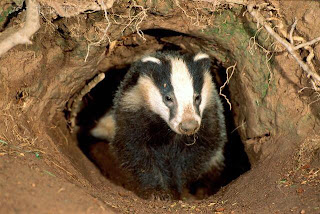True Wild Life | Badger | Badgers are found living in the forests of Europe and western Asia, scavenging for roots and berries as well as worms and insects. Amazingly badgers can run up to 30km an hour for short periods of time and have been known to successfully fight off bigger mammals such as wolves, coyotes and bears. There have been occasional reports over the years of badgers being particularly aggressive towards dogs and even humans. The badger is capable of producing a painful bite, and some badgers are also known to carry a type of rabies.The most commonly known badgers are the white and black striped badgers in western Europe.
Badgers are thought to be related to otters and weasels and can often grow to nearly a meter in length. The badger lives in underground burrows which often contains a maze of tunnels. It is thought that when digging its den, the badger is capable of removing tonnes of soil. Badger is the common name for any animal of the badger three subfamilies, which belong to the family Mustelidae. This is the same mammal family as the ferrets, the weasels, the otters, and several other types of carnivore meaning that the badger is most closely related to these animals.
There are eight different species of badger, and these badger species are split into three badger subfamilies, the badgers of Europe and Asia, the Ratel badger or honey badger, and the American badger. The Asian stink badger was once classified as a badger but today this badger species is thought to be more closely related to the skunk than the badger.
Typical badger species have short legs and badgers also tend to have a relatively heavy build. The badgers lower jaw is articulated to the badgers upper jaw meaning that it is almost impossible to dislocate the badgers jaw. This enables the badger to maintain its hold on the badgers prey with great ease, but limits the badgers jaw movement to hinging opening and shutting or sliding from side to side.




.jpg)



